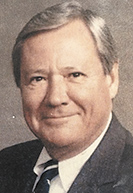Subscriber Benefit
As a subscriber you can listen to articles at work, in the car, or while you work out. Subscribe Now Pappas
PappasBy Nicholas C. Pappas
“That pretty wife of yours I saw you kiss goodbye at lunch — she’s probably ‘very truly’ to you. But I doubt your opposing counsel is ‘very truly’ to you.”
Bill Hutchens gave me this insight 27 years ago. I’ve signed letters “sincerely” ever since. And I think of him every time I sign a letter, or an associate writes a letter for me and closes with “very truly yours.” Bill was one of my mentors. While the way I sign letters hasn’t impacted my career, Bill taught me the value of humor — in life and law. This month we lost Bill after a long battle with Parkinson’s disease (a condition with which, coincidentally, my father, also a lawyer, was afflicted).
 Hutchens
HutchensBill knew how to make people laugh. And he used humor — very dry humor — effectively. When a plaintiff’s lawyer failed to return a call, Bill would tell the receptionist to “tell him Hutchens is calling and I have a wheelbarrow full of money for him.” (I’ve used this a few times, and it never fails.) When I prepared a brief or memo for Bill that required more than a few edits (the red ink was often brutal), Bill would hand it to me and say: “I just wanted to make sure you knew I read it.” Laughing can take the sting out of constructive criticism.
Sometimes Bill’s humor got him into trouble, but that never stopped him. One time, he decided to stop by a friend’s office unannounced. He told the receptionist to tell his friend that “his girlfriend’s husband is here to see him.” After Hutchens looked out the window and saw his friend running out of the building to his car, he realized his friend really did have a girlfriend with a husband. Another time, Bill stopped by the office of a friend who worked for a charitable foundation. Bill told the receptionist to tell him that “the IRS is here to see him.” Bill didn’t know that the foundation was in the midst of a huge tax fraud scandal.
Early in my career, I saw Bill select a jury in an emotionally charged apartment complex rape case. No one disputed that the plaintiff suffered horrible injuries, but the apartment complex denied liability for the criminal acts of the rapist. Bill tactfully used humor at appropriate times during voir dire, and at one point he had the prospective jurors talking to each other about how it’s not fair to hold one person responsible for another person’s conduct. The case settled shortly after the jury was seated.
No one enjoyed asking plaintiffs uncomfortable loss of consortium questions as much as Bill. He loved telling the story about the plaintiff who claimed that he went from having sex with his wife many times per day, every day of the week before the accident, to only three times per week after the accident. After many uncomfortable and detailed questions about plaintiff’s pre- and post- accident sex life, the plaintiff finally exploded: “Hutchens — before this accident my wife had a blue ribbon lover. Now she just has an average lover!” Bill replied “Let the record reflect that we are requesting all ribbons and awards that plaintiff has been awarded for his sexual achievements.” Plaintiff’s lawyer shook his head, terminated the deposition and left.
If Bill heard that a new associate planned a vacation, he would page the associate to his office late in the afternoon on the last day the associate planned on being in the office. Bill would pretend not to know about the planned vacation and would give the associate a big project that he needed first thing the next morning. Bill would wait until the associate was leaving his office before he smiled and let him in on the joke.
Bill also knew how to train lawyers. A little more than a year into my career, I was preparing my first case for a jury trial. The exposure was not substantial and liability was thin, but I probably looked a bit concerned about trial. Bill asked if I wanted a partner to go with me. Of course, I desperately wanted someone to go with me, but I said no. Bill let me try the case alone. He knew I was ready, and I learned a lot more by trying the case by myself than I would have if I had a more senior lawyer with me.
Bill, I’ll miss you, but I’m glad you’re no longer suffering. Thanks for making me laugh and teaching me how to practice law.•
__________
• Nicholas C. Pappas is a member at Frost Brown Todd whose practice concentrates on product liability and commercial litigation. Opinions expressed are those of the author.
Please enable JavaScript to view this content.
